Deakin University MIS313: Strategic Supply Chain Case Study on Renault
VerifiedAdded on 2023/06/10
|10
|2605
|277
Case Study
AI Summary
This case study report provides a detailed analysis of Renault's global operational strategy, focusing on its engine product type. The report examines Renault's client background, key decision factors, and the implications of various SCM metrics. It delves into Renault's commitment to sustainable practices, including circular economy initiatives like extending product life and reducing vehicle weight, aiming to minimize CO2 emissions. The study highlights Renault's partnerships with companies like DP World and DuPont to improve distribution networks and develop innovative equipment. Furthermore, it explores Renault's efforts in renewable energy, such as the Tangier facility, and the development of low-emission engines like E-TECH Hybrid. The report also addresses the importance of digital transformation in product design and the evaluation of environmental and social impacts through lifecycle assessments. The analysis concludes with Renault's strategic approach to addressing climate change, its materiality study, and its commitment to the Ellen MacArthur Foundation's circular economy principles. The report underscores the importance of low-carbon, adaptable transportation solutions and the role of digital solutions in achieving environmental goals.
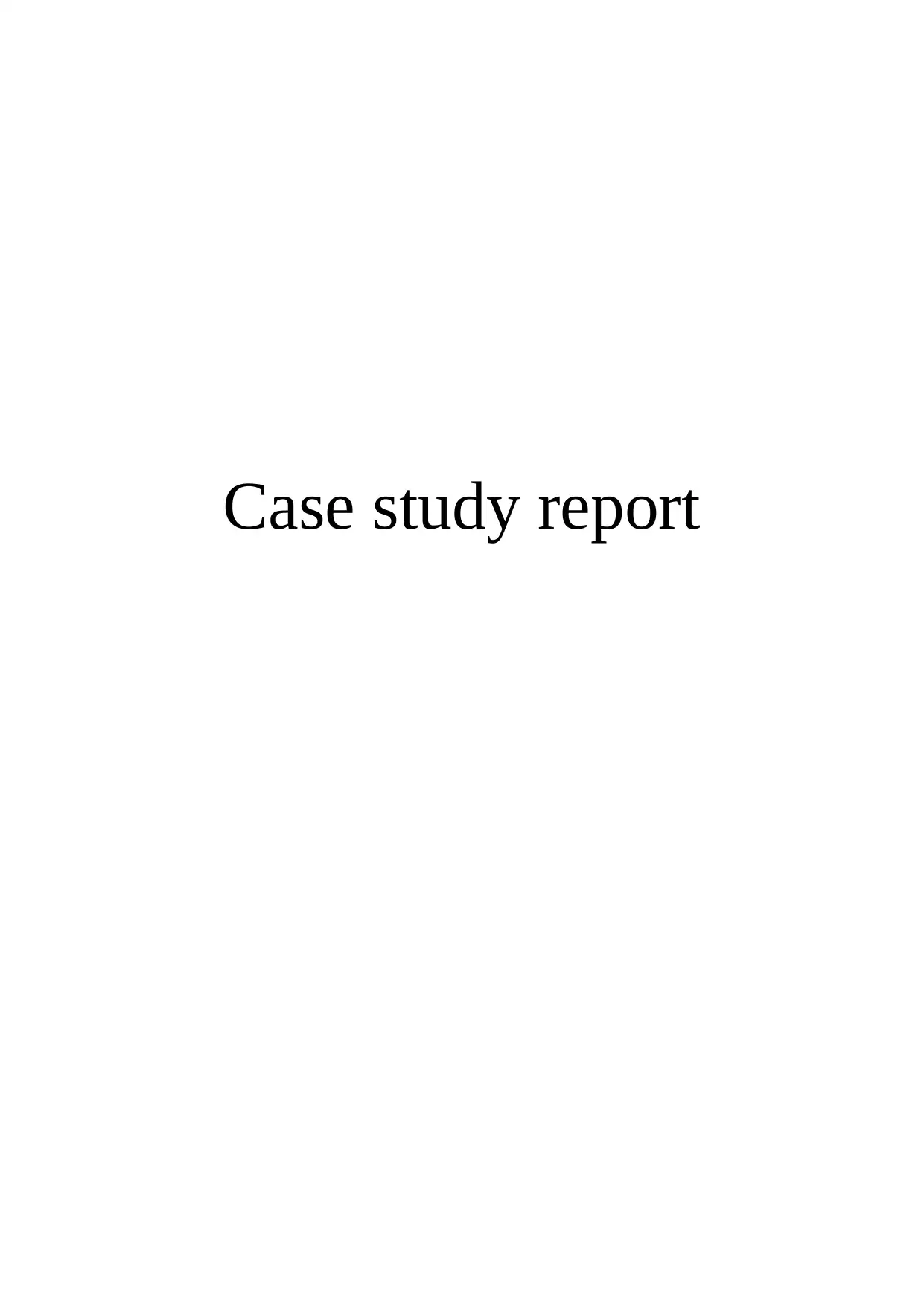
Case study report
Paraphrase This Document
Need a fresh take? Get an instant paraphrase of this document with our AI Paraphraser
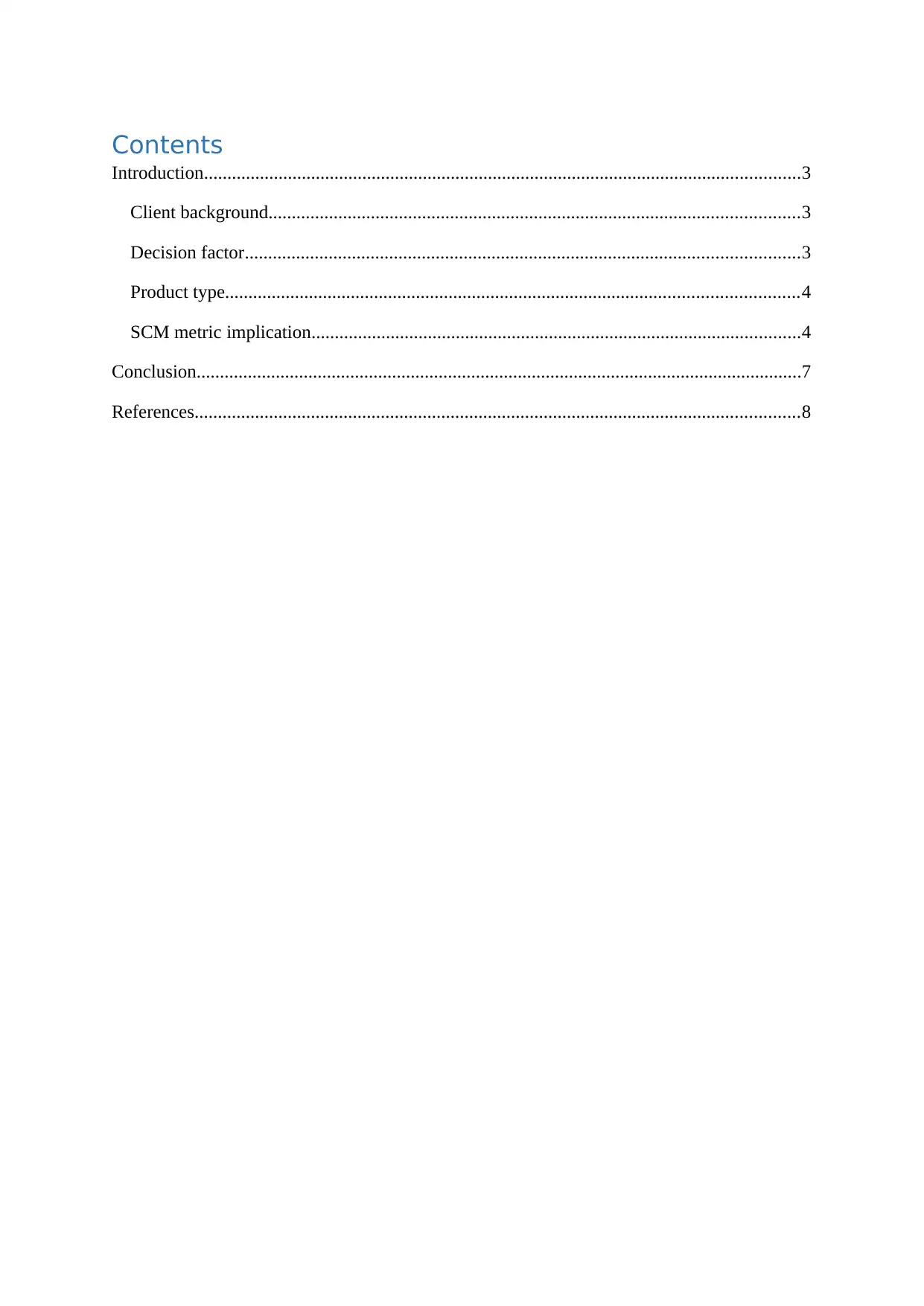
Contents
Introduction................................................................................................................................3
Client background..................................................................................................................3
Decision factor.......................................................................................................................3
Product type...........................................................................................................................4
SCM metric implication.........................................................................................................4
Conclusion..................................................................................................................................7
References..................................................................................................................................8
Introduction................................................................................................................................3
Client background..................................................................................................................3
Decision factor.......................................................................................................................3
Product type...........................................................................................................................4
SCM metric implication.........................................................................................................4
Conclusion..................................................................................................................................7
References..................................................................................................................................8
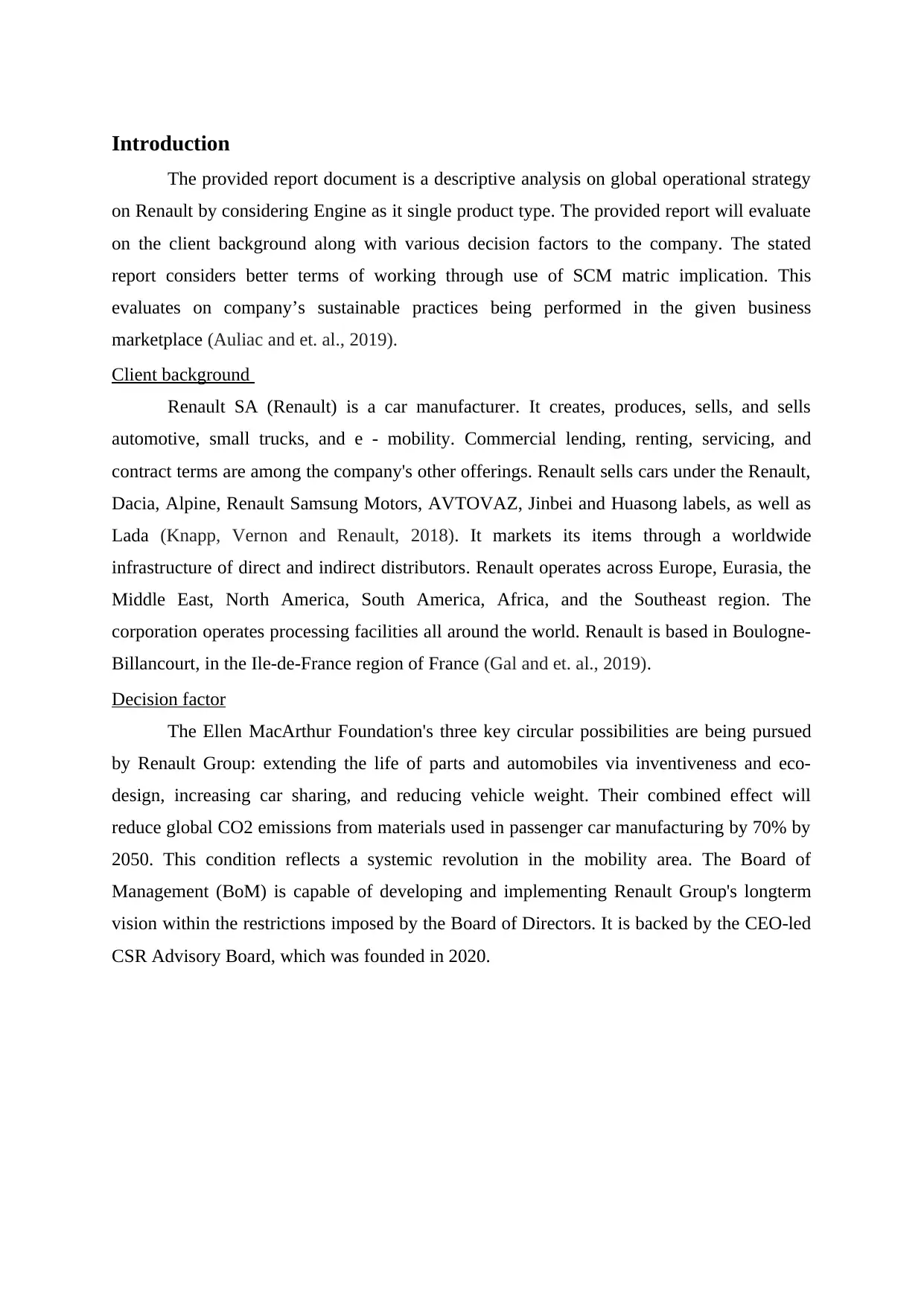
Introduction
The provided report document is a descriptive analysis on global operational strategy
on Renault by considering Engine as it single product type. The provided report will evaluate
on the client background along with various decision factors to the company. The stated
report considers better terms of working through use of SCM matric implication. This
evaluates on company’s sustainable practices being performed in the given business
marketplace (Auliac and et. al., 2019).
Client background
Renault SA (Renault) is a car manufacturer. It creates, produces, sells, and sells
automotive, small trucks, and e - mobility. Commercial lending, renting, servicing, and
contract terms are among the company's other offerings. Renault sells cars under the Renault,
Dacia, Alpine, Renault Samsung Motors, AVTOVAZ, Jinbei and Huasong labels, as well as
Lada (Knapp, Vernon and Renault, 2018). It markets its items through a worldwide
infrastructure of direct and indirect distributors. Renault operates across Europe, Eurasia, the
Middle East, North America, South America, Africa, and the Southeast region. The
corporation operates processing facilities all around the world. Renault is based in Boulogne-
Billancourt, in the Ile-de-France region of France (Gal and et. al., 2019).
Decision factor
The Ellen MacArthur Foundation's three key circular possibilities are being pursued
by Renault Group: extending the life of parts and automobiles via inventiveness and eco-
design, increasing car sharing, and reducing vehicle weight. Their combined effect will
reduce global CO2 emissions from materials used in passenger car manufacturing by 70% by
2050. This condition reflects a systemic revolution in the mobility area. The Board of
Management (BoM) is capable of developing and implementing Renault Group's longterm
vision within the restrictions imposed by the Board of Directors. It is backed by the CEO-led
CSR Advisory Board, which was founded in 2020.
The provided report document is a descriptive analysis on global operational strategy
on Renault by considering Engine as it single product type. The provided report will evaluate
on the client background along with various decision factors to the company. The stated
report considers better terms of working through use of SCM matric implication. This
evaluates on company’s sustainable practices being performed in the given business
marketplace (Auliac and et. al., 2019).
Client background
Renault SA (Renault) is a car manufacturer. It creates, produces, sells, and sells
automotive, small trucks, and e - mobility. Commercial lending, renting, servicing, and
contract terms are among the company's other offerings. Renault sells cars under the Renault,
Dacia, Alpine, Renault Samsung Motors, AVTOVAZ, Jinbei and Huasong labels, as well as
Lada (Knapp, Vernon and Renault, 2018). It markets its items through a worldwide
infrastructure of direct and indirect distributors. Renault operates across Europe, Eurasia, the
Middle East, North America, South America, Africa, and the Southeast region. The
corporation operates processing facilities all around the world. Renault is based in Boulogne-
Billancourt, in the Ile-de-France region of France (Gal and et. al., 2019).
Decision factor
The Ellen MacArthur Foundation's three key circular possibilities are being pursued
by Renault Group: extending the life of parts and automobiles via inventiveness and eco-
design, increasing car sharing, and reducing vehicle weight. Their combined effect will
reduce global CO2 emissions from materials used in passenger car manufacturing by 70% by
2050. This condition reflects a systemic revolution in the mobility area. The Board of
Management (BoM) is capable of developing and implementing Renault Group's longterm
vision within the restrictions imposed by the Board of Directors. It is backed by the CEO-led
CSR Advisory Board, which was founded in 2020.
⊘ This is a preview!⊘
Do you want full access?
Subscribe today to unlock all pages.

Trusted by 1+ million students worldwide
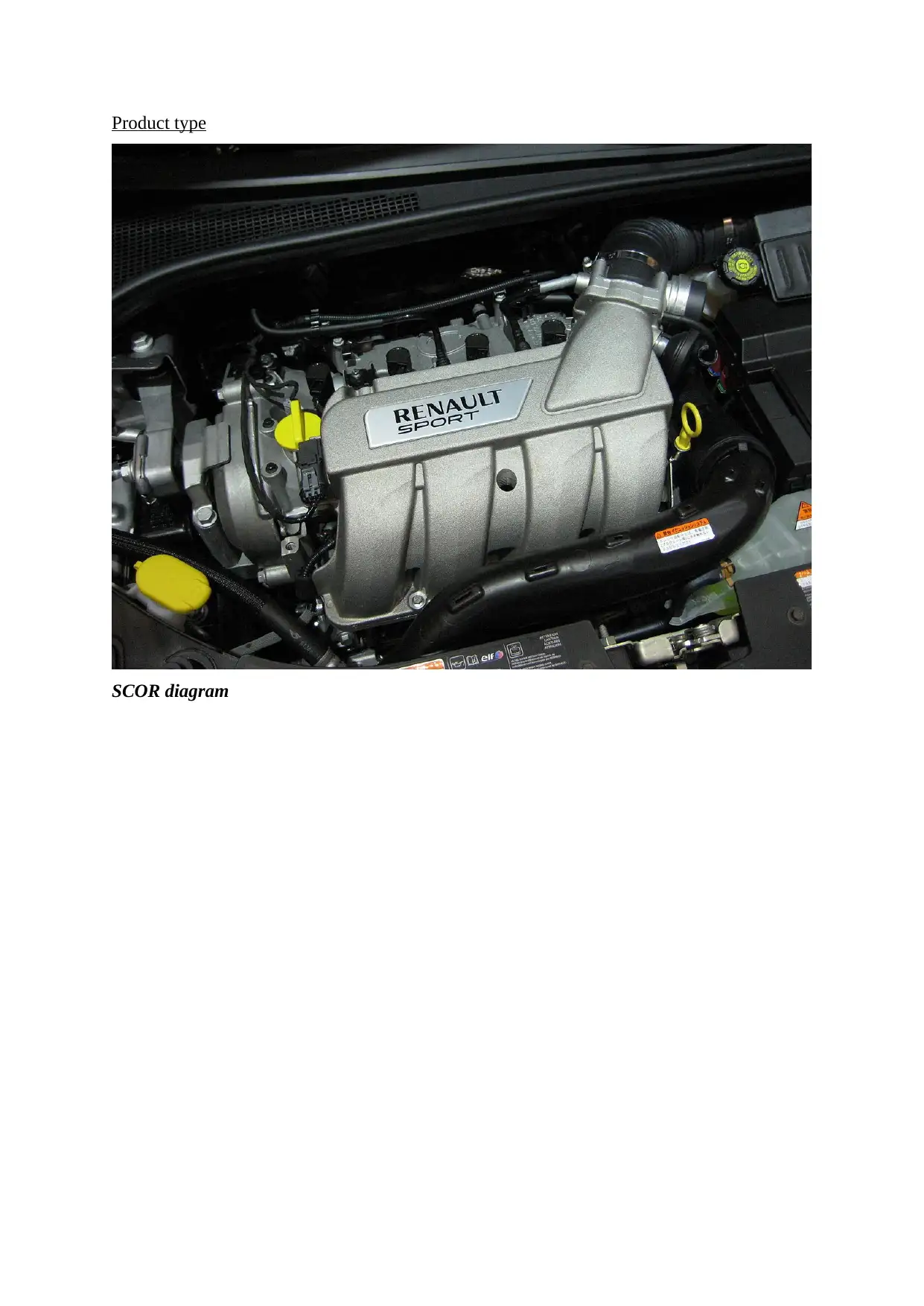
Product type
SCOR diagram
SCOR diagram
Paraphrase This Document
Need a fresh take? Get an instant paraphrase of this document with our AI Paraphraser
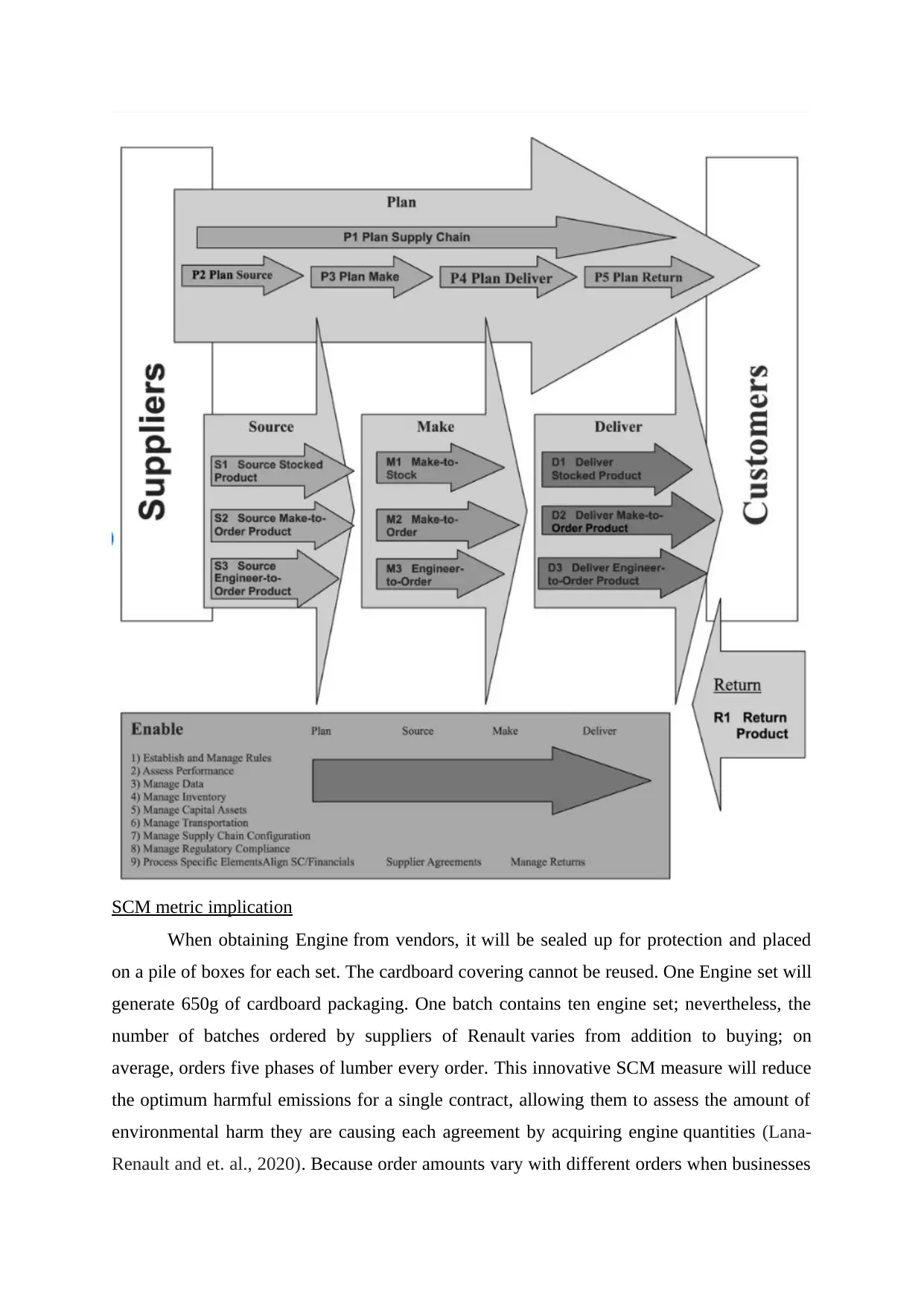
SCM metric implication
When obtaining Engine from vendors, it will be sealed up for protection and placed
on a pile of boxes for each set. The cardboard covering cannot be reused. One Engine set will
generate 650g of cardboard packaging. One batch contains ten engine set; nevertheless, the
number of batches ordered by suppliers of Renault varies from addition to buying; on
average, orders five phases of lumber every order. This innovative SCM measure will reduce
the optimum harmful emissions for a single contract, allowing them to assess the amount of
environmental harm they are causing each agreement by acquiring engine quantities (Lana-
Renault and et. al., 2020). Because order amounts vary with different orders when businesses
When obtaining Engine from vendors, it will be sealed up for protection and placed
on a pile of boxes for each set. The cardboard covering cannot be reused. One Engine set will
generate 650g of cardboard packaging. One batch contains ten engine set; nevertheless, the
number of batches ordered by suppliers of Renault varies from addition to buying; on
average, orders five phases of lumber every order. This innovative SCM measure will reduce
the optimum harmful emissions for a single contract, allowing them to assess the amount of
environmental harm they are causing each agreement by acquiring engine quantities (Lana-
Renault and et. al., 2020). Because order amounts vary with different orders when businesses
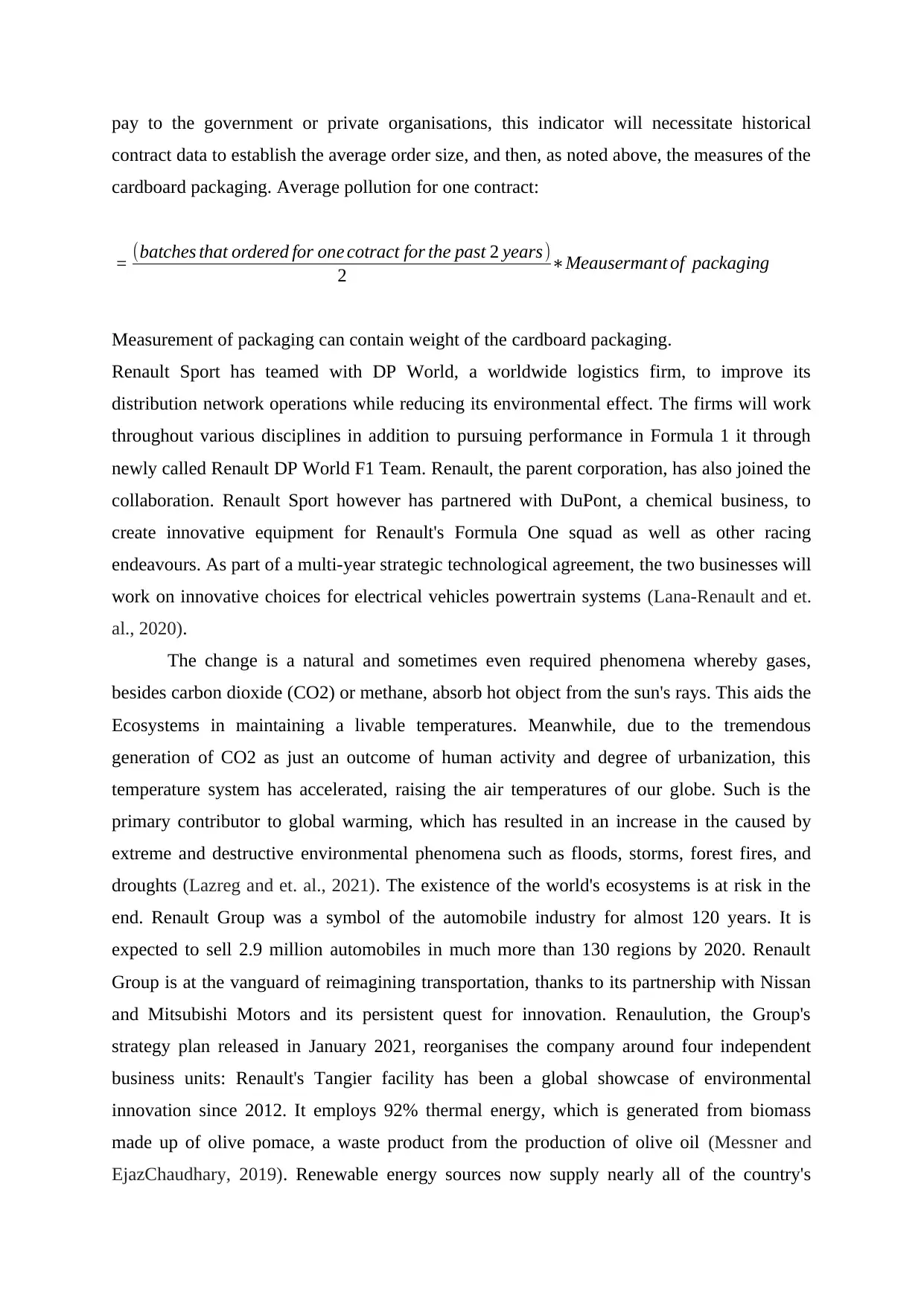
pay to the government or private organisations, this indicator will necessitate historical
contract data to establish the average order size, and then, as noted above, the measures of the
cardboard packaging. Average pollution for one contract:
= (batches that ordered for one cotract for the past 2 years)
2 ∗Meausermant of packaging
Measurement of packaging can contain weight of the cardboard packaging.
Renault Sport has teamed with DP World, a worldwide logistics firm, to improve its
distribution network operations while reducing its environmental effect. The firms will work
throughout various disciplines in addition to pursuing performance in Formula 1 it through
newly called Renault DP World F1 Team. Renault, the parent corporation, has also joined the
collaboration. Renault Sport however has partnered with DuPont, a chemical business, to
create innovative equipment for Renault's Formula One squad as well as other racing
endeavours. As part of a multi-year strategic technological agreement, the two businesses will
work on innovative choices for electrical vehicles powertrain systems (Lana-Renault and et.
al., 2020).
The change is a natural and sometimes even required phenomena whereby gases,
besides carbon dioxide (CO2) or methane, absorb hot object from the sun's rays. This aids the
Ecosystems in maintaining a livable temperatures. Meanwhile, due to the tremendous
generation of CO2 as just an outcome of human activity and degree of urbanization, this
temperature system has accelerated, raising the air temperatures of our globe. Such is the
primary contributor to global warming, which has resulted in an increase in the caused by
extreme and destructive environmental phenomena such as floods, storms, forest fires, and
droughts (Lazreg and et. al., 2021). The existence of the world's ecosystems is at risk in the
end. Renault Group was a symbol of the automobile industry for almost 120 years. It is
expected to sell 2.9 million automobiles in much more than 130 regions by 2020. Renault
Group is at the vanguard of reimagining transportation, thanks to its partnership with Nissan
and Mitsubishi Motors and its persistent quest for innovation. Renaulution, the Group's
strategy plan released in January 2021, reorganises the company around four independent
business units: Renault's Tangier facility has been a global showcase of environmental
innovation since 2012. It employs 92% thermal energy, which is generated from biomass
made up of olive pomace, a waste product from the production of olive oil (Messner and
EjazChaudhary, 2019). Renewable energy sources now supply nearly all of the country's
contract data to establish the average order size, and then, as noted above, the measures of the
cardboard packaging. Average pollution for one contract:
= (batches that ordered for one cotract for the past 2 years)
2 ∗Meausermant of packaging
Measurement of packaging can contain weight of the cardboard packaging.
Renault Sport has teamed with DP World, a worldwide logistics firm, to improve its
distribution network operations while reducing its environmental effect. The firms will work
throughout various disciplines in addition to pursuing performance in Formula 1 it through
newly called Renault DP World F1 Team. Renault, the parent corporation, has also joined the
collaboration. Renault Sport however has partnered with DuPont, a chemical business, to
create innovative equipment for Renault's Formula One squad as well as other racing
endeavours. As part of a multi-year strategic technological agreement, the two businesses will
work on innovative choices for electrical vehicles powertrain systems (Lana-Renault and et.
al., 2020).
The change is a natural and sometimes even required phenomena whereby gases,
besides carbon dioxide (CO2) or methane, absorb hot object from the sun's rays. This aids the
Ecosystems in maintaining a livable temperatures. Meanwhile, due to the tremendous
generation of CO2 as just an outcome of human activity and degree of urbanization, this
temperature system has accelerated, raising the air temperatures of our globe. Such is the
primary contributor to global warming, which has resulted in an increase in the caused by
extreme and destructive environmental phenomena such as floods, storms, forest fires, and
droughts (Lazreg and et. al., 2021). The existence of the world's ecosystems is at risk in the
end. Renault Group was a symbol of the automobile industry for almost 120 years. It is
expected to sell 2.9 million automobiles in much more than 130 regions by 2020. Renault
Group is at the vanguard of reimagining transportation, thanks to its partnership with Nissan
and Mitsubishi Motors and its persistent quest for innovation. Renaulution, the Group's
strategy plan released in January 2021, reorganises the company around four independent
business units: Renault's Tangier facility has been a global showcase of environmental
innovation since 2012. It employs 92% thermal energy, which is generated from biomass
made up of olive pomace, a waste product from the production of olive oil (Messner and
EjazChaudhary, 2019). Renewable energy sources now supply nearly all of the country's
⊘ This is a preview!⊘
Do you want full access?
Subscribe today to unlock all pages.

Trusted by 1+ million students worldwide
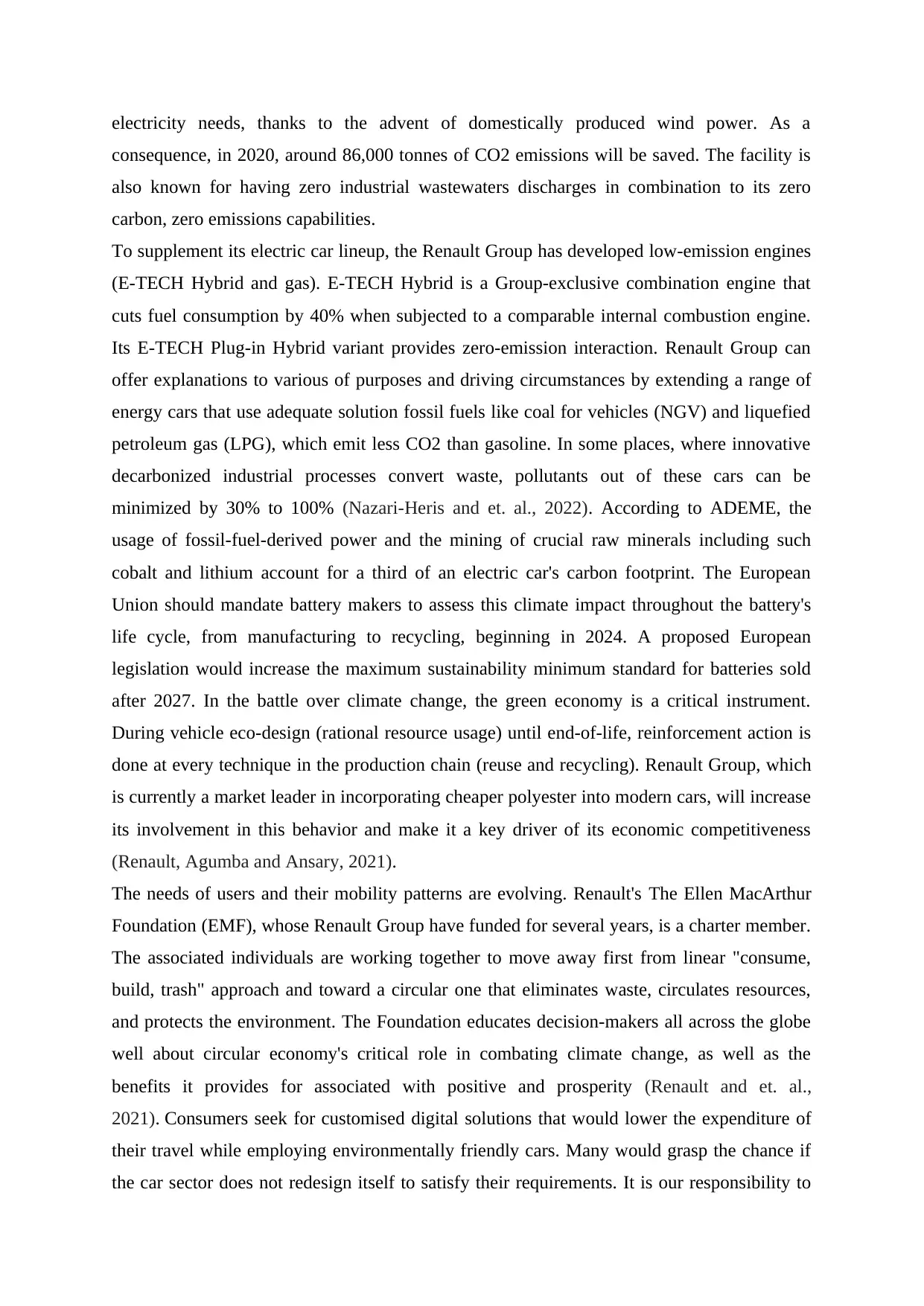
electricity needs, thanks to the advent of domestically produced wind power. As a
consequence, in 2020, around 86,000 tonnes of CO2 emissions will be saved. The facility is
also known for having zero industrial wastewaters discharges in combination to its zero
carbon, zero emissions capabilities.
To supplement its electric car lineup, the Renault Group has developed low-emission engines
(E-TECH Hybrid and gas). E-TECH Hybrid is a Group-exclusive combination engine that
cuts fuel consumption by 40% when subjected to a comparable internal combustion engine.
Its E-TECH Plug-in Hybrid variant provides zero-emission interaction. Renault Group can
offer explanations to various of purposes and driving circumstances by extending a range of
energy cars that use adequate solution fossil fuels like coal for vehicles (NGV) and liquefied
petroleum gas (LPG), which emit less CO2 than gasoline. In some places, where innovative
decarbonized industrial processes convert waste, pollutants out of these cars can be
minimized by 30% to 100% (Nazari-Heris and et. al., 2022). According to ADEME, the
usage of fossil-fuel-derived power and the mining of crucial raw minerals including such
cobalt and lithium account for a third of an electric car's carbon footprint. The European
Union should mandate battery makers to assess this climate impact throughout the battery's
life cycle, from manufacturing to recycling, beginning in 2024. A proposed European
legislation would increase the maximum sustainability minimum standard for batteries sold
after 2027. In the battle over climate change, the green economy is a critical instrument.
During vehicle eco-design (rational resource usage) until end-of-life, reinforcement action is
done at every technique in the production chain (reuse and recycling). Renault Group, which
is currently a market leader in incorporating cheaper polyester into modern cars, will increase
its involvement in this behavior and make it a key driver of its economic competitiveness
(Renault, Agumba and Ansary, 2021).
The needs of users and their mobility patterns are evolving. Renault's The Ellen MacArthur
Foundation (EMF), whose Renault Group have funded for several years, is a charter member.
The associated individuals are working together to move away first from linear "consume,
build, trash" approach and toward a circular one that eliminates waste, circulates resources,
and protects the environment. The Foundation educates decision-makers all across the globe
well about circular economy's critical role in combating climate change, as well as the
benefits it provides for associated with positive and prosperity (Renault and et. al.,
2021). Consumers seek for customised digital solutions that would lower the expenditure of
their travel while employing environmentally friendly cars. Many would grasp the chance if
the car sector does not redesign itself to satisfy their requirements. It is our responsibility to
consequence, in 2020, around 86,000 tonnes of CO2 emissions will be saved. The facility is
also known for having zero industrial wastewaters discharges in combination to its zero
carbon, zero emissions capabilities.
To supplement its electric car lineup, the Renault Group has developed low-emission engines
(E-TECH Hybrid and gas). E-TECH Hybrid is a Group-exclusive combination engine that
cuts fuel consumption by 40% when subjected to a comparable internal combustion engine.
Its E-TECH Plug-in Hybrid variant provides zero-emission interaction. Renault Group can
offer explanations to various of purposes and driving circumstances by extending a range of
energy cars that use adequate solution fossil fuels like coal for vehicles (NGV) and liquefied
petroleum gas (LPG), which emit less CO2 than gasoline. In some places, where innovative
decarbonized industrial processes convert waste, pollutants out of these cars can be
minimized by 30% to 100% (Nazari-Heris and et. al., 2022). According to ADEME, the
usage of fossil-fuel-derived power and the mining of crucial raw minerals including such
cobalt and lithium account for a third of an electric car's carbon footprint. The European
Union should mandate battery makers to assess this climate impact throughout the battery's
life cycle, from manufacturing to recycling, beginning in 2024. A proposed European
legislation would increase the maximum sustainability minimum standard for batteries sold
after 2027. In the battle over climate change, the green economy is a critical instrument.
During vehicle eco-design (rational resource usage) until end-of-life, reinforcement action is
done at every technique in the production chain (reuse and recycling). Renault Group, which
is currently a market leader in incorporating cheaper polyester into modern cars, will increase
its involvement in this behavior and make it a key driver of its economic competitiveness
(Renault, Agumba and Ansary, 2021).
The needs of users and their mobility patterns are evolving. Renault's The Ellen MacArthur
Foundation (EMF), whose Renault Group have funded for several years, is a charter member.
The associated individuals are working together to move away first from linear "consume,
build, trash" approach and toward a circular one that eliminates waste, circulates resources,
and protects the environment. The Foundation educates decision-makers all across the globe
well about circular economy's critical role in combating climate change, as well as the
benefits it provides for associated with positive and prosperity (Renault and et. al.,
2021). Consumers seek for customised digital solutions that would lower the expenditure of
their travel while employing environmentally friendly cars. Many would grasp the chance if
the car sector does not redesign itself to satisfy their requirements. It is our responsibility to
Paraphrase This Document
Need a fresh take? Get an instant paraphrase of this document with our AI Paraphraser
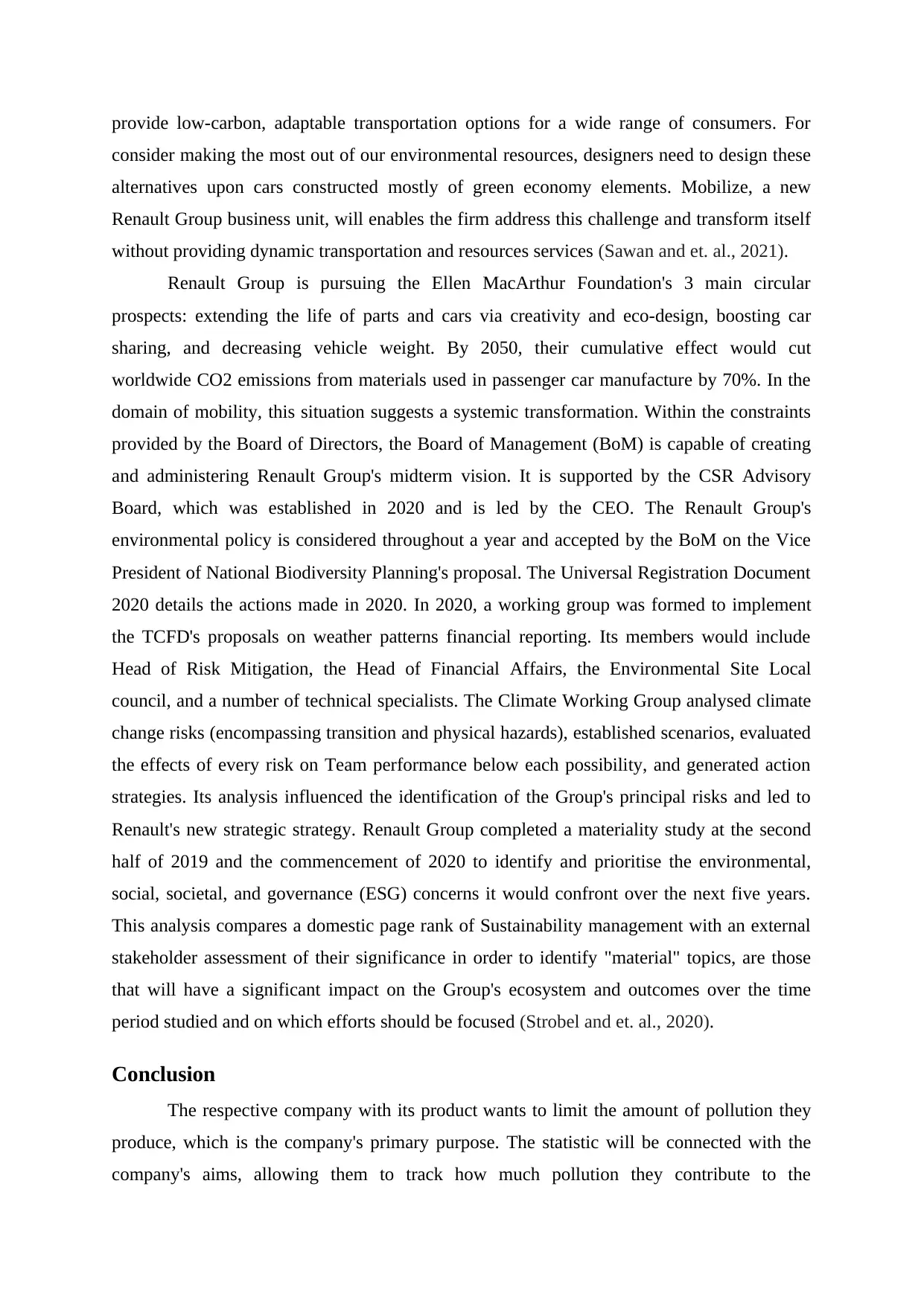
provide low-carbon, adaptable transportation options for a wide range of consumers. For
consider making the most out of our environmental resources, designers need to design these
alternatives upon cars constructed mostly of green economy elements. Mobilize, a new
Renault Group business unit, will enables the firm address this challenge and transform itself
without providing dynamic transportation and resources services (Sawan and et. al., 2021).
Renault Group is pursuing the Ellen MacArthur Foundation's 3 main circular
prospects: extending the life of parts and cars via creativity and eco-design, boosting car
sharing, and decreasing vehicle weight. By 2050, their cumulative effect would cut
worldwide CO2 emissions from materials used in passenger car manufacture by 70%. In the
domain of mobility, this situation suggests a systemic transformation. Within the constraints
provided by the Board of Directors, the Board of Management (BoM) is capable of creating
and administering Renault Group's midterm vision. It is supported by the CSR Advisory
Board, which was established in 2020 and is led by the CEO. The Renault Group's
environmental policy is considered throughout a year and accepted by the BoM on the Vice
President of National Biodiversity Planning's proposal. The Universal Registration Document
2020 details the actions made in 2020. In 2020, a working group was formed to implement
the TCFD's proposals on weather patterns financial reporting. Its members would include
Head of Risk Mitigation, the Head of Financial Affairs, the Environmental Site Local
council, and a number of technical specialists. The Climate Working Group analysed climate
change risks (encompassing transition and physical hazards), established scenarios, evaluated
the effects of every risk on Team performance below each possibility, and generated action
strategies. Its analysis influenced the identification of the Group's principal risks and led to
Renault's new strategic strategy. Renault Group completed a materiality study at the second
half of 2019 and the commencement of 2020 to identify and prioritise the environmental,
social, societal, and governance (ESG) concerns it would confront over the next five years.
This analysis compares a domestic page rank of Sustainability management with an external
stakeholder assessment of their significance in order to identify "material" topics, are those
that will have a significant impact on the Group's ecosystem and outcomes over the time
period studied and on which efforts should be focused (Strobel and et. al., 2020).
Conclusion
The respective company with its product wants to limit the amount of pollution they
produce, which is the company's primary purpose. The statistic will be connected with the
company's aims, allowing them to track how much pollution they contribute to the
consider making the most out of our environmental resources, designers need to design these
alternatives upon cars constructed mostly of green economy elements. Mobilize, a new
Renault Group business unit, will enables the firm address this challenge and transform itself
without providing dynamic transportation and resources services (Sawan and et. al., 2021).
Renault Group is pursuing the Ellen MacArthur Foundation's 3 main circular
prospects: extending the life of parts and cars via creativity and eco-design, boosting car
sharing, and decreasing vehicle weight. By 2050, their cumulative effect would cut
worldwide CO2 emissions from materials used in passenger car manufacture by 70%. In the
domain of mobility, this situation suggests a systemic transformation. Within the constraints
provided by the Board of Directors, the Board of Management (BoM) is capable of creating
and administering Renault Group's midterm vision. It is supported by the CSR Advisory
Board, which was established in 2020 and is led by the CEO. The Renault Group's
environmental policy is considered throughout a year and accepted by the BoM on the Vice
President of National Biodiversity Planning's proposal. The Universal Registration Document
2020 details the actions made in 2020. In 2020, a working group was formed to implement
the TCFD's proposals on weather patterns financial reporting. Its members would include
Head of Risk Mitigation, the Head of Financial Affairs, the Environmental Site Local
council, and a number of technical specialists. The Climate Working Group analysed climate
change risks (encompassing transition and physical hazards), established scenarios, evaluated
the effects of every risk on Team performance below each possibility, and generated action
strategies. Its analysis influenced the identification of the Group's principal risks and led to
Renault's new strategic strategy. Renault Group completed a materiality study at the second
half of 2019 and the commencement of 2020 to identify and prioritise the environmental,
social, societal, and governance (ESG) concerns it would confront over the next five years.
This analysis compares a domestic page rank of Sustainability management with an external
stakeholder assessment of their significance in order to identify "material" topics, are those
that will have a significant impact on the Group's ecosystem and outcomes over the time
period studied and on which efforts should be focused (Strobel and et. al., 2020).
Conclusion
The respective company with its product wants to limit the amount of pollution they
produce, which is the company's primary purpose. The statistic will be connected with the
company's aims, allowing them to track how much pollution they contribute to the
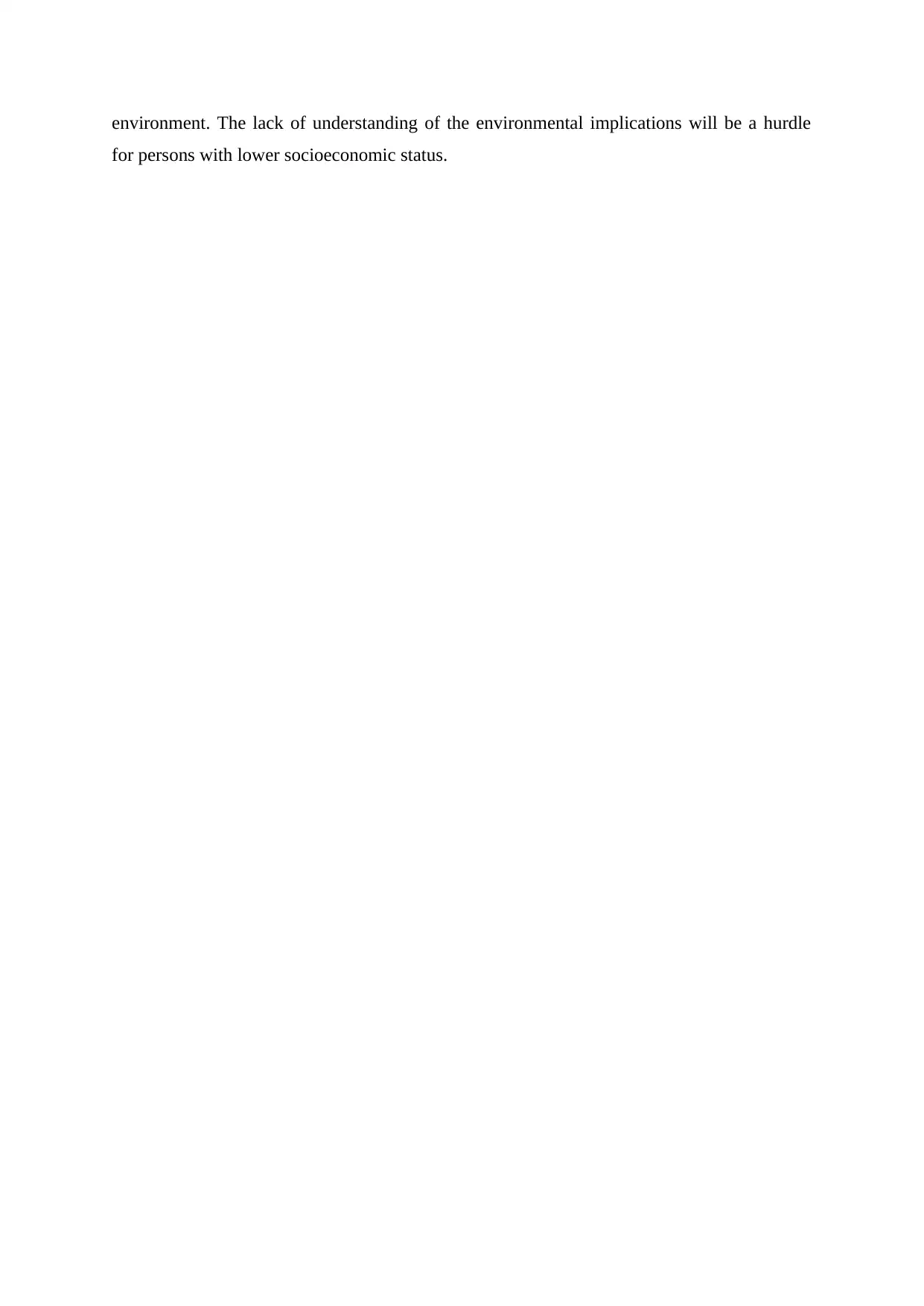
environment. The lack of understanding of the environmental implications will be a hurdle
for persons with lower socioeconomic status.
for persons with lower socioeconomic status.
⊘ This is a preview!⊘
Do you want full access?
Subscribe today to unlock all pages.

Trusted by 1+ million students worldwide
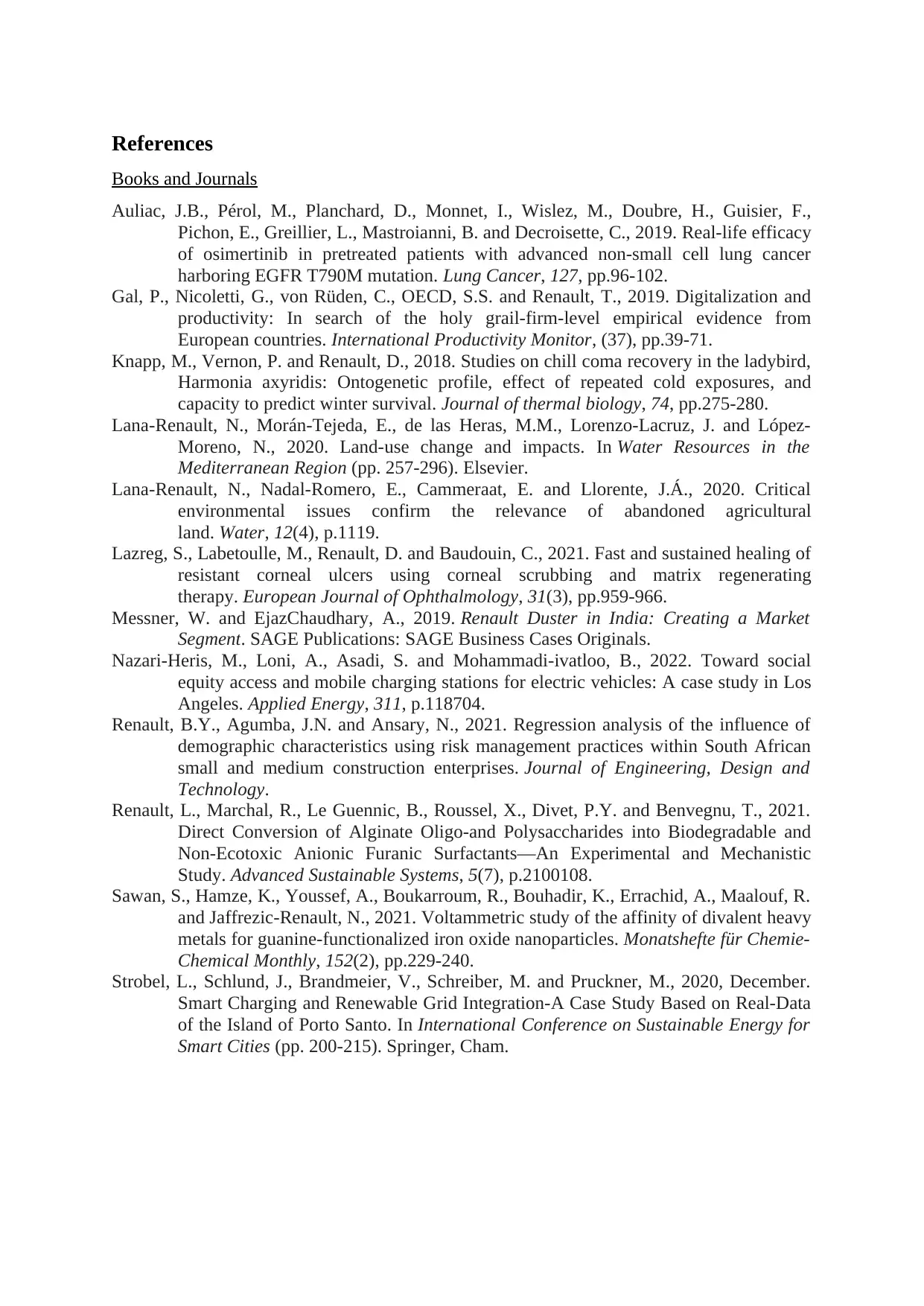
References
Books and Journals
Auliac, J.B., Pérol, M., Planchard, D., Monnet, I., Wislez, M., Doubre, H., Guisier, F.,
Pichon, E., Greillier, L., Mastroianni, B. and Decroisette, C., 2019. Real-life efficacy
of osimertinib in pretreated patients with advanced non-small cell lung cancer
harboring EGFR T790M mutation. Lung Cancer, 127, pp.96-102.
Gal, P., Nicoletti, G., von Rüden, C., OECD, S.S. and Renault, T., 2019. Digitalization and
productivity: In search of the holy grail-firm-level empirical evidence from
European countries. International Productivity Monitor, (37), pp.39-71.
Knapp, M., Vernon, P. and Renault, D., 2018. Studies on chill coma recovery in the ladybird,
Harmonia axyridis: Ontogenetic profile, effect of repeated cold exposures, and
capacity to predict winter survival. Journal of thermal biology, 74, pp.275-280.
Lana-Renault, N., Morán-Tejeda, E., de las Heras, M.M., Lorenzo-Lacruz, J. and López-
Moreno, N., 2020. Land-use change and impacts. In Water Resources in the
Mediterranean Region (pp. 257-296). Elsevier.
Lana-Renault, N., Nadal-Romero, E., Cammeraat, E. and Llorente, J.Á., 2020. Critical
environmental issues confirm the relevance of abandoned agricultural
land. Water, 12(4), p.1119.
Lazreg, S., Labetoulle, M., Renault, D. and Baudouin, C., 2021. Fast and sustained healing of
resistant corneal ulcers using corneal scrubbing and matrix regenerating
therapy. European Journal of Ophthalmology, 31(3), pp.959-966.
Messner, W. and EjazChaudhary, A., 2019. Renault Duster in India: Creating a Market
Segment. SAGE Publications: SAGE Business Cases Originals.
Nazari-Heris, M., Loni, A., Asadi, S. and Mohammadi-ivatloo, B., 2022. Toward social
equity access and mobile charging stations for electric vehicles: A case study in Los
Angeles. Applied Energy, 311, p.118704.
Renault, B.Y., Agumba, J.N. and Ansary, N., 2021. Regression analysis of the influence of
demographic characteristics using risk management practices within South African
small and medium construction enterprises. Journal of Engineering, Design and
Technology.
Renault, L., Marchal, R., Le Guennic, B., Roussel, X., Divet, P.Y. and Benvegnu, T., 2021.
Direct Conversion of Alginate Oligo‐and Polysaccharides into Biodegradable and
Non‐Ecotoxic Anionic Furanic Surfactants—An Experimental and Mechanistic
Study. Advanced Sustainable Systems, 5(7), p.2100108.
Sawan, S., Hamze, K., Youssef, A., Boukarroum, R., Bouhadir, K., Errachid, A., Maalouf, R.
and Jaffrezic-Renault, N., 2021. Voltammetric study of the affinity of divalent heavy
metals for guanine-functionalized iron oxide nanoparticles. Monatshefte für Chemie-
Chemical Monthly, 152(2), pp.229-240.
Strobel, L., Schlund, J., Brandmeier, V., Schreiber, M. and Pruckner, M., 2020, December.
Smart Charging and Renewable Grid Integration-A Case Study Based on Real-Data
of the Island of Porto Santo. In International Conference on Sustainable Energy for
Smart Cities (pp. 200-215). Springer, Cham.
Books and Journals
Auliac, J.B., Pérol, M., Planchard, D., Monnet, I., Wislez, M., Doubre, H., Guisier, F.,
Pichon, E., Greillier, L., Mastroianni, B. and Decroisette, C., 2019. Real-life efficacy
of osimertinib in pretreated patients with advanced non-small cell lung cancer
harboring EGFR T790M mutation. Lung Cancer, 127, pp.96-102.
Gal, P., Nicoletti, G., von Rüden, C., OECD, S.S. and Renault, T., 2019. Digitalization and
productivity: In search of the holy grail-firm-level empirical evidence from
European countries. International Productivity Monitor, (37), pp.39-71.
Knapp, M., Vernon, P. and Renault, D., 2018. Studies on chill coma recovery in the ladybird,
Harmonia axyridis: Ontogenetic profile, effect of repeated cold exposures, and
capacity to predict winter survival. Journal of thermal biology, 74, pp.275-280.
Lana-Renault, N., Morán-Tejeda, E., de las Heras, M.M., Lorenzo-Lacruz, J. and López-
Moreno, N., 2020. Land-use change and impacts. In Water Resources in the
Mediterranean Region (pp. 257-296). Elsevier.
Lana-Renault, N., Nadal-Romero, E., Cammeraat, E. and Llorente, J.Á., 2020. Critical
environmental issues confirm the relevance of abandoned agricultural
land. Water, 12(4), p.1119.
Lazreg, S., Labetoulle, M., Renault, D. and Baudouin, C., 2021. Fast and sustained healing of
resistant corneal ulcers using corneal scrubbing and matrix regenerating
therapy. European Journal of Ophthalmology, 31(3), pp.959-966.
Messner, W. and EjazChaudhary, A., 2019. Renault Duster in India: Creating a Market
Segment. SAGE Publications: SAGE Business Cases Originals.
Nazari-Heris, M., Loni, A., Asadi, S. and Mohammadi-ivatloo, B., 2022. Toward social
equity access and mobile charging stations for electric vehicles: A case study in Los
Angeles. Applied Energy, 311, p.118704.
Renault, B.Y., Agumba, J.N. and Ansary, N., 2021. Regression analysis of the influence of
demographic characteristics using risk management practices within South African
small and medium construction enterprises. Journal of Engineering, Design and
Technology.
Renault, L., Marchal, R., Le Guennic, B., Roussel, X., Divet, P.Y. and Benvegnu, T., 2021.
Direct Conversion of Alginate Oligo‐and Polysaccharides into Biodegradable and
Non‐Ecotoxic Anionic Furanic Surfactants—An Experimental and Mechanistic
Study. Advanced Sustainable Systems, 5(7), p.2100108.
Sawan, S., Hamze, K., Youssef, A., Boukarroum, R., Bouhadir, K., Errachid, A., Maalouf, R.
and Jaffrezic-Renault, N., 2021. Voltammetric study of the affinity of divalent heavy
metals for guanine-functionalized iron oxide nanoparticles. Monatshefte für Chemie-
Chemical Monthly, 152(2), pp.229-240.
Strobel, L., Schlund, J., Brandmeier, V., Schreiber, M. and Pruckner, M., 2020, December.
Smart Charging and Renewable Grid Integration-A Case Study Based on Real-Data
of the Island of Porto Santo. In International Conference on Sustainable Energy for
Smart Cities (pp. 200-215). Springer, Cham.
1 out of 10
Your All-in-One AI-Powered Toolkit for Academic Success.
+13062052269
info@desklib.com
Available 24*7 on WhatsApp / Email
![[object Object]](/_next/static/media/star-bottom.7253800d.svg)
Unlock your academic potential
Copyright © 2020–2026 A2Z Services. All Rights Reserved. Developed and managed by ZUCOL.